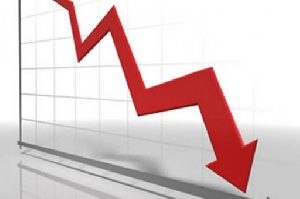Consumer confidence this year has eased consistently for a fourth consecutive time to reach 98.1 percent in the month of August, according to a survey conducted by the Bank of Ghana (BoG).
According to the survey conducted, consumer confidence recorded a decline to 105.9 percent in February 2018 from 107.6 recorded in the August 2017. The Bi-monthly survey showed that April and June 2018 recorded declines of 104.0 and 102.2 respectively.
The Consumer Confidence Survey reflects prevailing business conditions and likely developments for the months ahead. This bi-monthly report details consumer attitudes and buying intentions.
In an interview with Goldstreet Business on this latest development, Senior Lecturer at the University of Ghana Business School (UGBS), Dr. Lord Mensah identified the exchange rates and on-going banking crisis as contributing factors to this fall in consumer confidence.
Dr. Mensah said, “possibly we are looking at exchange rate in the markets – Ghana is net importer of goods and services. So, if interest rates go up, obviously it has the tendency to affect the confidence of the consumer when it comes to using products that are imported.”
He also noted that inflation has the tendency to affect consumer confidence.
This year, consumer inflation has seen instabilities from 10.6 percent recorded in February to 9.6 percent in April, then to 9.8 percent in May, inching up to 10.0 percent in June. July and August also recorded the same trend of 9.6 percent to 9.9 percent respectively.
Dr. Mensah further noted that the availability of funds to customers by the banks has the potential of affecting consumer confidence.
Private sector credit growth continues to recover, although at a moderate pace, as the on-going balance sheet restructuring by the banks continues. Private sector credit in August 2018 grew by 15.8 percent year-on-year compared with 6.5 percent a year earlier. In real terms, private sector credit expanded by 5.4 percent in August against a contraction of 5 percent over the same period last year.
Century Bond
Speaking on the government’s plans to raise the US$ 50 billion century bond, Dr. Mensah remained skeptical of the capacity of the country to absorb such a fund.
“Remember such bond goes with long-term cash-flow and for long-term cash flow, it means the project that you are going to put those bonds into, should be able to stand the test of time,” Dr. Mensah stated.
He quickly noted that the history of the country with regards to servicing of these debts, further extends to affect the foreign exchange rates.
“So, if you are going for US$ 50 billion which is for 100 years, then we need to structure the economy for which, whatever money we borrow goes into the project that we are looking forward to,” he said.
Business News of Monday, 1 October 2018
Source: goldstreetbusiness.com
Consumer confidence drops fourth consecutive time in August 2018
Entertainment












